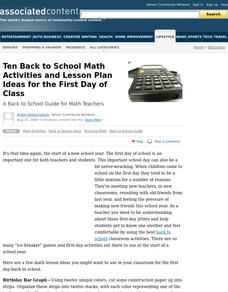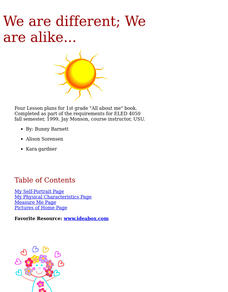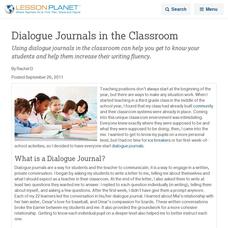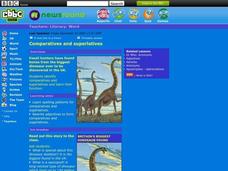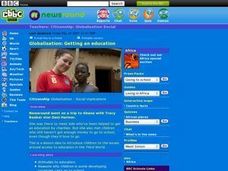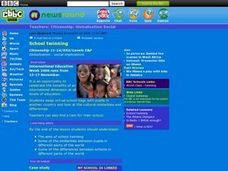Curated OER
Graphing Stories Ice Breaker
Kick off the school year with some math fun! New classmates share information about themselves by using graphs and interpreting data. The goal is to use a general graph shape, such as linear or exponential, and create labels for the axes...
Curated OER
Meet Your Neighbor: Action Verbs
Get your kids moving on the first day of school! This action verb activity doesn't have to be used as an ice breaker, but it sure will work as one. Simply place pairs of cards face-side down on the carpet, each with an action verb...
Primary Resources
Drama Warm Ups and Circle Games
Circle games, energetic games, calming games, exit games. Whether used as ice breakers, warm ups, or exit strategies, or used in drama classes or content areas, the 28 games detailed in this packet deserve a spot in your curriculum library.
Curated OER
Hey Teachers! Get to Know Me!
Foster community in your classroom and encourage learners to get up and get to know each other. Individuals each receive the classmate inventory handout included and use it to fill in information about their fellow scholars. Once they...
Curated OER
Getting to Know You
After going over the five steps of the writing process, pupils fill out "Getting to Know You" worksheets. They trade papers with each other, and have the task of writing a descriptive paragraph about the person whose worksheet they...
Curated OER
Beginning The New School Year
Third graders investigate the concept of living in a community of learners. They engage in a variety of activities with the highlight being a story about a meerkat and a lion. Students read a play related to the story and discuss the...
Curated OER
Ice Breakers: A Lab Experience About the Effects of Global Warming on Icecaps
Learners describe the physical properties of ice and speculates on the dangers that icecaps might pose on a global scale. They then demonstrate, through a series of experiments, several physical properties of ice (ability to fracture,...
Curated OER
What's in a Name?
Pupils read an imagined profile about themselves written by a new teacher. They find definitions for words they do not explain and then explain to partners what is or isn't correct about their profiles.
Curated OER
Getting to Know You
Need a first day ice breaker? Try this getting to know you exercise. Pupils stand in a circle and introduce themselves. The trick is they add an adjective that describes them and starts with the same letter as their first name. Add a...
Curated OER
First Day of Class
Students create birthday bar graphs, read books, make math windows, and more for the first day of math class. In this first day of class lesson plan, students also create pyramids.
Curated OER
We Are Different; We Are Alike........
First graders explain that everybody is unique in their own way by participating in this lively, art and language based series of lesson plans. They would greatly benefit from engaging in these plans in the beginning of the year as an...
Curated OER
Getting To Know You
Students listen to the book "I like me" by Nancy Carison, or a similar self-esteem book, and then create self-portraitswhile the song "Getting to Know You" is being played. This is an excellent ice-breaker for the beginning of the...
Curated OER
introduction
Students participate in a lesson that is intended for the first days of school. They are led through introductions and how the class is organized for working on a daily basis. They sign behavior contracts and other paperwork as directed...
Curated OER
Finding Problems In A Story
Students categorize information into a problem/solving chart and examine the value of using a diary. In this problem solving and diary activity, students read portions of Dear Mr. Henshaw, while they investigate the importance of keeping...
Curated OER
Make reading cool
Students look at ways of encouraging others to read and write a letter to Jacqueline Wilson. Students read a a news article on Jackqueline Wilson. They discuss ways or promoting reading. Students imagine they are an author invited to...
Curated OER
Persuasive Language
Students read a persuasive story study persuasive language. They then write a 50-word online advertisement for a target audience to try and sell an unusual item to a targeted audience.
Curated OER
Bias
Learners apply techniques of distinguishing between fact and opinion. Students identify words associated with persuasion and argument. Learners read and categorizer a variety of newspapers and articles. Students identfy bias in a...
Curated OER
Dialogue Journals in the Classroom
Using dialogue journals in the classroom can help you get to know your students and help them increase their writing fluency.
Curated OER
Writing Book Reviews
Students explore new authors and genres they might like to read. The understand the ingredients of a book review. They write book reviews using persuasive language to recommend books.
Curated OER
11 September memorial
Students analyze the events of September 11. They read news stories and discuss the events of September 2001. Students explore the meaning of symblism. They design a memorial to commemorate the event.
Curated OER
Emotive language
Students examine emotion-based language. Students read a news story to discover examples of emotive words. They develop a class list of examples of emotive language. As a class project, students select a news story and change it into...
Curated OER
Comparatives and superlatives
Students identify comparatives and superlatives. Students read article on comparatives and superlatives. They explore spelling patterns. Students rewite adjectives to form comparatives and superlatives and complete a worksheet.
Curated OER
Globalisation: Getting an education
Students are reading the story about Dani Harmer. In pairs they write down five things they know about life in Africa. They then are asked why do they think Dani Harmer wants to draw students's attention to the value of education? ...
Curated OER
School twinning
Students brainstorm the term school twinning. The teacher makes a class list of student's suggestions. Students are asked: Why do you think some schools form partnerships with schools from other countries? They then read the Press...











